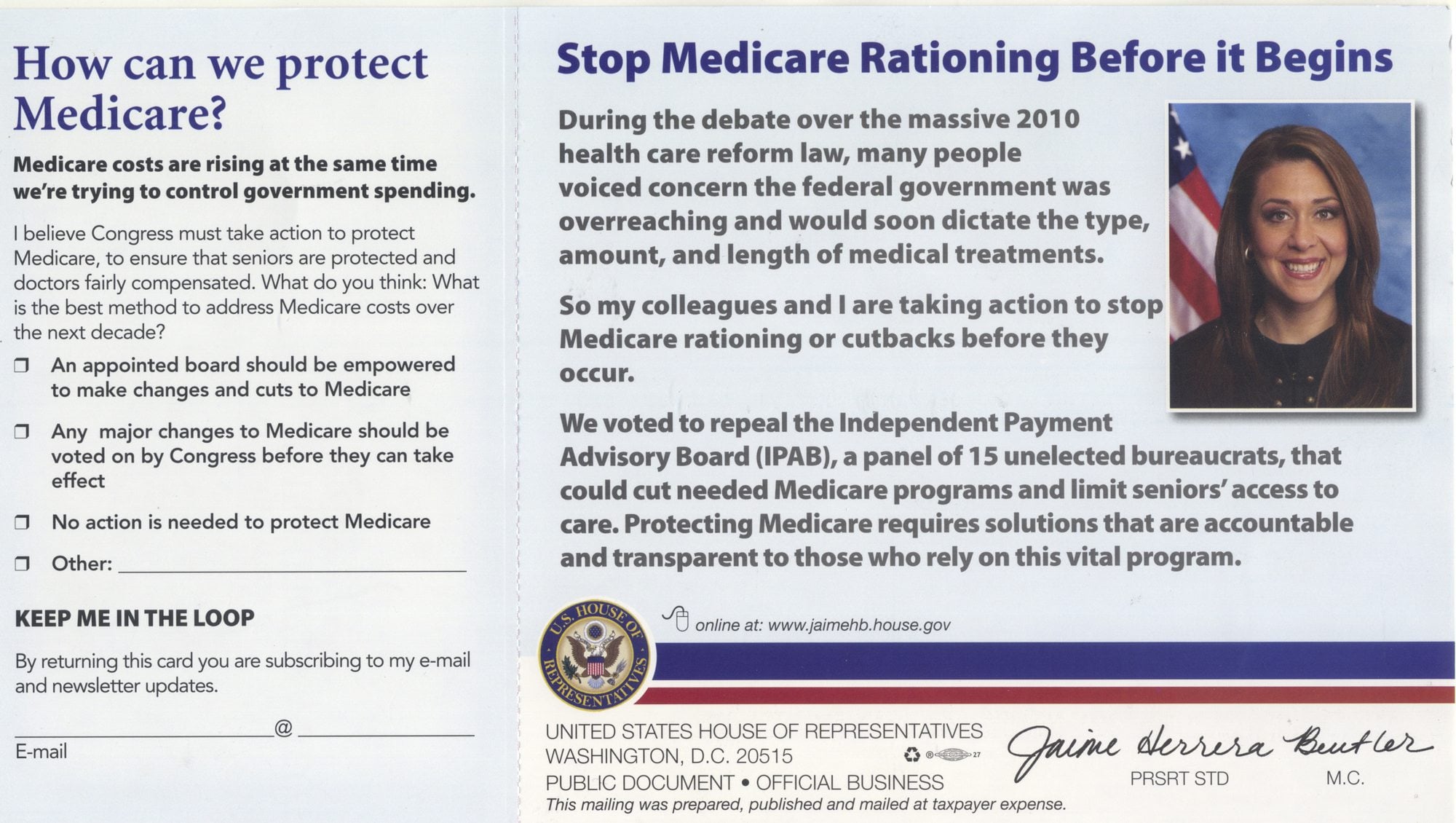A flier U.S. Rep. Jaime Herrera Beutler, R-Camas, recently mailed to 80,000 constituents includes information about Medicare that has raised eyebrows with fact-checking organizations. Her spokesman, however, says the first-term congresswoman stands by her statements.
On the Web: PolitiFact
Washington Post fact checkers
The Kaiser Family Foundation report on IPAB
The flier, which cost the government $37,000 to print and distribute, includes a mail-back survey about Medicare. The flier states that the Independent Payment Advisory Board created through the 2010 Patient Protection and Affordable Care Act — dubbed “Obamacare” — would ration Medicare services to seniors, cut $500 billion from Medicare to expand another entitlement, and bankrupt the Medicare fund in nine years.
Similar statements were made in a television ad that aired last month featuring musician, actor and conservative political activist Pat Boone. The ad, which was sponsored by the conservative group 60 Plus Association, prompted the St. Petersburg Times’
Pulitzer Prize-winning PolitiFact website and the fact checkers at the Washington Post to dig deeper.
During the health care reform debates in 2009, many politicians raised concerns about the costly growth of Medicare, the nation’s health care program for seniors and people with disabilities. Government agencies in the past have made recommendations for reforming the system, but those suggestions weren’t mandatory and they were tough to get through Congress.
Supporters of the advisory board have argued that an independent agency with more teeth is needed because members of Congress can be influenced by campaign donations from the health care industry, which makes it harder to pass effective reforms.
According to the health care reform law, the advisory board must consist of 15 members, including doctors, economists, researchers and technology experts. The president must consult Republican and Democratic members of Congress when appointing the board members, and each appointment needs Senate approval.
The board would begin making recommendations next year if finance officials determine Medicare spending is growing too large, and their recommendations would be implemented by 2015, assuming Congress accepts them. The board has a limit on how much it can reduce spending, and if members of Congress reject the suggestions, Congress has 2 months to propose its own plan that would save the same amount of money.
The health care reform law aims to put the burden of reducing Medicare costs on health care service providers, including insurance and drug companies.
Medicare rationing?
Fact checkers at the Washington Post called Boone’s ad “Mediscare hooey,” partly because it includes the claim that the advisory board would have the power to ration Medicare services.
Similarly, Herrera Beutler’s flier tells Clark County residents: “My colleagues and I are taking action to stop Medicare rationing or cutbacks before they occur.” She also called the advisory board “a panel of 15 unelected bureaucrats, that could cut needed Medicare programs and limit seniors’ access to care.”
The law states the board’s mandatory recommendations can’t ration care, cut benefits or shift costs to Medicare recipients, according to a report published by the Kaiser Family Foundation, a nonprofit, nonpartisan health care research group. Hospitals and hospices are also off limits for the first few years of IPAB’s existence. The law does not prohibit the board from making recommendations affecting the Medicare Advantage program, the Medicare Part D prescription drug program and skilled nursing facility services.
The reforms could result in less generous benefit packages for those enrolled in the Medicare Advantage program, according to the Kaiser Family Foundation. The Medicare Advantage program, or Part C, allows patients to get their Medicare benefits through a private insurer.
“The IPAB can push for changes that impact some areas of health care, and that could have an indirect result on care for seniors,” according to PolitiFact. “The board, however, cannot propose changes that impact the most widely used forms of care — such as inpatient hospital services, long-term care and hospice — for Medicare beneficiaries.”
Herrera Beutler’s spokesman, Casey Bowman, upheld the congresswoman’s statements that the board would have the power to ration Medicare. He said in an email that the board could create policies that would cut reimbursement rates to physicians, and in turn that could prompt doctors to turn away Medicare patients.
“IPAB is specifically tasked with cutting provider rates,” Bowman said. “The threat is that these reimbursement levels will fall so low that hardly any physicians will be able to afford providing care to seniors.”
The health care reform law tasks the independent advisory board with saving money without limiting access to health care, but “there is no further clarification of how this is to be determined,” according to the Kaiser Family Foundation report.
Bankruptcy statement
Herrera Beutler’s flier and the Pat Boone ad both cite the Congressional Budget Office when making the statement that Medicare will be bankrupt in nine years. PolitiFact rates this statement as false because it overstates the budget office’s report.
The report shows that the Hospital Insurance Trust Fund, which pays for one of four parts of Medicare, is projected to be exhausted in 2021, but the other funding sources for Medicare are not projected to run out in nine years.
“The Hospital Insurance fund does have big problems, but that’s not the same thing as being ‘bankrupt,’ a legal term that doesn’t apply to federal governmental programs,” according to PolitiFact’s report.
PolitiFact also points out that experts previously have predicted the Hospital Insurance Trust Fund would run out of money.
“In 1970, when the program was only four years old, the insolvency date was 1972,” according to PolitiFact. “For the next 16 years, trustees expected the fund to be exhausted by the 1990s. Congress repeatedly changed legislation to lower fund spending and keep it from going dry.”
Bowman, Herrera Beutler’s spokesman, said Democratic sources, including President Barack Obama, have made similar statements that Medicare is at risk of running out of money.
Slowing growth
Herrera Beutler’s flier states the health care reform law will cut $500 billion from Medicare to pay for another entitlement program.
The law tries to slow the projected growth of the Medicare program by about $500 billion over the next 10 years and use those savings to pay for new costs in the health care law.
It is fair to say that Obama is partially funding the health care law through reductions in Medicare spending, the fact checkers at the Washington Post have reported. “But it is misleading to suggest that Medicare has been weakened by this accounting maneuver,” they say.
Herrera Beutler’s flier advising constituents to “stop Medicare rationing before it begins” includes a survey that people can mail back to the congresswoman, with the addition of their own postage stamp. The survey first mentions Herrera Beutler’s stance on the Independent Payment Advisory Board and then asks which method is best to address Medicare costs during the next decade.
The options in the survey are:
• An appointed board should be empowered to make changes and cuts to Medicare.
• Any major changes to Medicare should be voted on by Congress before they can take effect.
• No action is needed to protect Medicare.
• Other.
The flier was sent out earlier this month to residents throughout the 3rd Congressional District.
Herrera Beutler sent out another flier earlier this year to Clark County residents, asking them whether the public should vote on the Columbia River Crossing project including light rail between Portland and Vancouver. That flier cost her office $31,500 and was sent only to homes in which someone had voted in at least two elections since 2008.
Last year, Herrera Beutler spent 75.6 percent of her $1.5 million 2011 budget, although some expenses have yet to be reported because they are paid after the end of the year, according to the Legistorm online database. Only 21 U.S. House members spent a smaller percentage of their budgets, according to the data.
The $1.5 million budget pays for office expenses, including payroll for her staff and money for mailing out fliers, but it does not include her salary. The salary for most U.S. House and Senate members is $174,000 a year.
Since becoming a congresswoman, Herrera Beutler has received about $105,000 in campaign contributions from companies and employees in the health care, pharmaceutical and hospital industries, according to the nonprofit group OpenSecrets.org, which tracks money in politics.
Stevie Mathieu: 360-735-4523 or stevie.mathieu@columbian.com or www.facebook.com/reportermathieu or www.twitter.com/col_politics.




